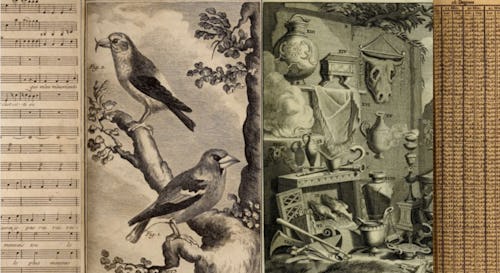
The Internet Archive’s Book Images account on Flickr started in 2014, and in its seven and a half years, it’s been a time portal to the past. Its repository of quirky vintage illustrations, fascinating preserved posters, and old books numbers over 5 million and users created personal galleries and added tags. The crowdsourced metadata allowed users to effectively search for the items they wanted — it’s far more efficient to search a keyword than to sift through pages, and pages, of scans.
From century-old fairy tales to tomes about falling in love via telegraph wires, old books provide both archival value and endless entertainment. Any book published in the U.S. before 1926 is in the public domain, and just because a book has been collecting dust for a few centuries, doesn’t mean it’s boring.
But a few weeks ago, poof!
The account disappeared. The deletion was swift and quiet, but users soon noticed. On a Flickr forum, fans of the Internet Archive Book Images account called the loss an unfathomable “destruction of knowledge.” One user wrote: the deletion “really impacted my life,” while another wrote “to find all these golden needles in the same haystack a second time again seems impossible.”
On the forum, a Flickr staff member confirmed the deletion:
“Flickr and Internet Archive were in agreement on this because: 1) The account was largely comprised of scans of book images, not photos; 2) The account was no longer being actively managed by Internet Archive.; 3) The book images tended to show up in irrelevant search results of Flickr Commons photography.”
But users didn’t quite understand why the account had to be deleted from Flickr entirely instead of altered to deal with the problems. Couldn’t you, say, add a button so people uninterested in book scans could filter them out? And why hadn’t there been any warning?
The curation and invaluable metadata — favorites, tags, and comments that artists, historians, and other old book-enjoyers had contributed — was gone. The Public Domain Review shared that the links to the now thousands of saved images lead to a “Page Not Found” announcement.
Happy ending —
After a Twitter thread by Danish designer Jonas Lönborg brought attention to the heartbreaking erasure, Flickr CEO Don MacAskill responded that Flickr’s recommendation for the Internet Archive to delete the account had been “a mistake.” He explained that the 5 million book images “were drowning out the rest of the Commons members” and announced a new solution: Flickr will restore the account but move it out of the Commons. With the permission and support of the Internet Archive, the book images will receive CC0 copyright, moving them to public domain.
The creator of the original 2008 Flickr Commons program, George Oates, wrote on a Flickr forum that “deleting materials, especially from a digital Commons, should not be done without very careful planning, and we didn’t plan it well enough, or communicate the plan well enough.”
The fiasco shows the precious and precarious nature of web-based archival material: here one minute, gone the next. Though the internet’s content is ultimately fragile and transitory, it lies at the whim of flukey decisions in boardrooms or neglected external dependencies.







